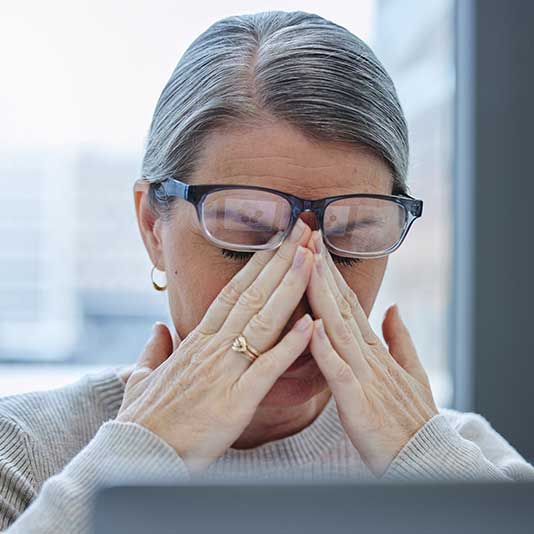Brain fog and the menopause
How to cope when your brain isn’t playing ball.
Like many women’s health issues, the menopause has often fallen behind when it comes to research and treatment developments.1 Unsurprising but, one saving grace is the recent media coverage and campaigning from celebrities such as Davina McCall and Lorraine Kelly who have been giving menopause and its plethora of unfair symptoms and insufficient treatment options a platform over the last few years. One symptom in particular ‘brain-fog’ has been getting some serious airtime of late, as women have been calling for work adjustments and recognition when going through the menopause.
‘Menopause brain’ aka brain fog is a thing. Coined medically as ‘a symptom of hormonal imbalance’ has seen women struggling with everything from forgetting names to losing things for decades. And, while these may not sound debilitating on their own, collectively brain fog can be. Many women have described feeling as if they’re going mad or even fearing they have early onset dementia. Brain fog is real – here’s what it is and what you can do about it.
But what actually is brain fog?
Put simply, brain fog is memory defectiveness and forgetfulness caused by menopause. There are a number of things which can contribute towards a woman’s experience of brain fog. Firstly, the drop in the hormone progesterone can cause issues for women including mood swings, sleep disturbances and, brain fog. Then there is the dip in oestrogen which can cause the delightful hot flushes, confusion, decreased energy and… you’ve got it - brain fog.2
The two things at play here are:
The hormonal dips and imbalances
The effects the hormones have that cause brain fog
For example, bad sleep and depression, caused by menopause, are likely to affect mental cognition and things like memory.

Day-to-day, how does brain fog affect you
Brain fog can be broken down into three different areas: forgetfulness, impaired information retention and lack of concentration. And, this can manifest itself in many different ways for different women.
These symptoms can affect everything from professional development to relationships, with lots of women citing menopause as having negatively impacted their career 3 and home life. This can include everything from not remembering important dates, and forgetting your keys to walking into a room and not knowing why you’re there. And, although you may be thinking this is something which happens to a lot of people, this can be particularly debilitating and frustrating when it’s such a juxtaposition to how you normally operate. Particularly when combined with a busy home life and stressful job.
Okay, I have brain fog! What can I do about it?
Firstly, don’t panic! There are options available to support you to get back to the happiest, healthiest version of yourself. And crucially, remember, you aren’t alone. In fact, 75% of women experience symptoms of menopause.4 Let’s look at what options are available to help you weather the menopause storm:
HRT aka Hormone Replacement Therapy
Given that a LOT and we mean a lot of the negative symptoms of menopause are caused by dips in hormones, ‘hormone replacement therapy’ or HRT as it is known, can be a great treatment option to help mitigate menopause’s difficult symptoms. Your GP may offer you HRT if you’re experiencing any of the following symptoms including night sweats, hot flushes, mood swings and reduced sex drive.5 It essentially works by replacing the hormones you’re losing as part of menopause.
HRT can be taken in different ways, with some women opting for stick-on patches, gels, tablets and even vaginal creams and pessaries.6 It combines oestrogen and progestogen (a synthetic form of progesterone) known as combined HRT or, oestrogen only. So, what’s right for you? Your GP will consider your medical history when choosing what HRT treatment is right for you, for example, they won’t recommend certain types of HRT if you have a family history of breast cancer or blood clots.7 There is also the option to take a small amount of testosterone as part of your treatment, this has been thought to boost mood and increase energy and libido levels.8
Lifestyle – sleep, diet & exercise
Back to our three favourite lifestyle pillars: sleep, diet and exercise. All are of course important for general health,9 however when it comes to menopause there are further benefits to keeping up with your diet, workout and sleep routine.
In the UK and US around 30% of postmenopausal women are reported to have osteoporosis,10 a disease related to diminishing bone density that makes sufferers more susceptible to breaks and fractures. Why does this happen? Well, oestrogen helps to protect your bones and the dip in oestrogen production can contribute toward poor bone health.11 But what can we do to improve this? Exercise including strength, weight and balance training can improve your bone strength and lessen your chances of breaking or fracturing bones.12 Also, diet can contribute to bone strength. Ensuring you get enough calcium and vitamin D can help you keep your bones in check.13 Calcium can be found in dairy products, green leafy veg, nuts (including milks for vegans) and fish. For vitamin D, look for supplements and sun. Maybe an excuse for a winter holiday? You can also find vitamin D in fish and egg yolks.

As well as keeping your bones healthy vitamin D is important to keep your brain and mood level and, food and exercise can be the perfect remedy. Depression and mood swings are also a symptom of menopause so ensuring you’re breaking a sweat, whether that’s running or yoga is going to increase your production of serotonin and endorphins and therefore boost your mood.14 Unfortunately, a symptom of depression is brain fog and impaired memory. Ensuring you’re eating a balanced, healthy and nutrient-rich diet is also key to keeping your mood in check. From enough vitamins A, B, C, D and E to iron and calcium, food can be important when contributing to your overall health. For example, fatty fish, berries, nuts and whole grains are thought to be great mood-boosting foods.15 There is also a lot to be said for keeping your gut healthy as, research has suggested, both dopamine and serotonin and other ‘happy hormones’ are made in your gut.16 Consuming probiotics and prebiotics through yoghurt, fermented food and supplements can help take care of your gut and produce much-needed happy hormones. The take-home: food is powerful.
Brain training & alternative therapies
So, you’re getting forgetful and aren’t as quick with the comebacks as you once were. Studies have shown training your brain can help improve your cognitive function,17 something which we know menopausal brain fog can affect. From learning a new language to jigsaw puzzles and sudoku, keeping your mind active combined with a healthy diet and workout routine will help improve your memory. Meditation is also thought to improve cognitive function and mental clarity, as well as boasting a whole lot of other benefits.
There are also supplements you can take to support brain health including basically all the B vitamins, vitamin D, creatine, folic acid and omega 3.18 All these can be found in both supplements and your food.
Hopefully, this has given you some optimism and shown there are many options if you’re experiencing brain fog as a symptom of menopause. And, with the great work from charities and organisations such as The Menopause Charity and Menopause Support UK, remember that further help and support is out there.
How Simplyhealth can help
Our 24/7 online GP services allow you to speak with a professional who can advise and refer you after discussing your menopause symptoms at a quick and convenient time that works for you.* Our on-demand counselling services ensure someone is always there to listen and help you get through whatever you’re dealing with.
*Please note: the online GP service is unavailable on Christmas Day.
References
2 https://www.nhs.uk/conditions/menopause/symptoms
3 https://www.cipd.co.uk/about/media/press/menopause-at-work
5&6https://www.nhs.uk/conditions/hormone-replacement-therapy-hrt
7&8 https://hormonehealth.co.uk/hrt-which-type-is-right-for-you
9 https://www.nhs.uk/live-well
10 https://www.ncbi.nlm.nih.gov/pmc/articles/PMC6429007
11 https://www.nhs.uk/live-well/bone-health/food-for-strong-bones
12 https://www.themenopausecharity.org/2021/04/24/exercise-advice
13 https://www.nhs.uk/live-well/bone-health/food-for-strong-bones
14 https://www.ncbi.nlm.nih.gov/pmc/articles/PMC2077351
15 https://www.healthline.com/nutrition/mood-food#2.-Dark-chocolate
16 https://www.ncbi.nlm.nih.gov/pmc/articles/PMC5526216
18 https://www.nhs.uk/conditions/vitamins-and-minerals/others